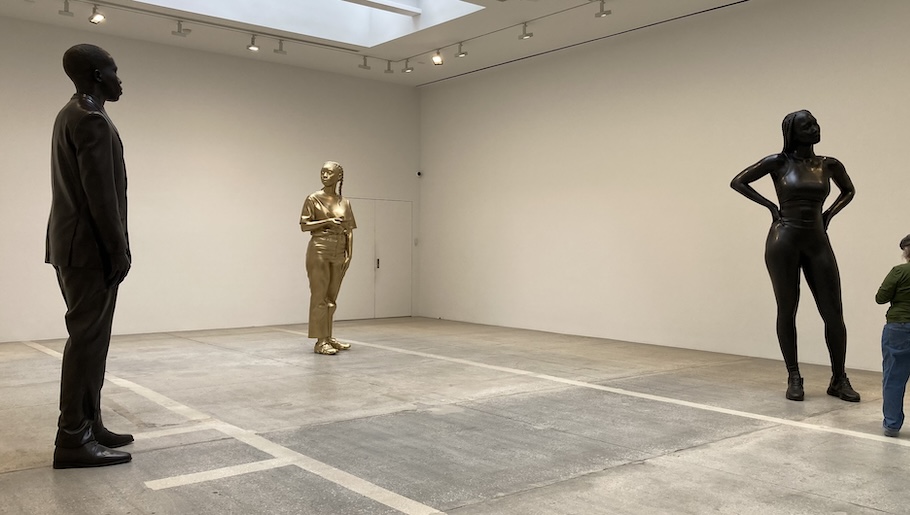But such is the irresistible nature of truth, that all it asks, and all it wants, is the liberty of appearing.
—Thomas Paine

Thomas J. Price. From left to right: “A Kind of Confidence,” “A Place Beyond,” “As Sound Turns to Noise.” Bronze. From the exhibition “Persistence of Scale,” Hauser & Wirth, NYC. April 24-June 14, 2025.
Sly, Brian, and the Family Affair of Everyday Good Vibrations
Everybody is a star
I can feel it when you shine on me
I love you for who you are
Not the one you feel you need to be…
No artist has invoked and embodied the liberatory carnavelesque: “Everyday People,” “Stand!,” “Dance to the Music” with a greater degree of insurgent popular radicalism than Sly Stone did. Listening, moving and, yes, rioting to his music one feels, even if one knows only the “mystery” and not the “history,” his connection to a thousand rebellions of the ancient and modern enslaved, but also to the spiritual, at times mystical, throughline running from John Ball and the Peasant’s Revolt of 1381, the Ranters, Levelers and Diggers of the 17th century English revolution, echoes of which resounded at the time of this country’s founding in Paine’s Common Sense.
Stand, in the end, you’ll still be you
One that’s done all the things you set out to do
Stand, there’s a cross for you to bear
Things to go through if you’re goin’ anywhere
Stand for the things you know are right
It’s the truth that the truth makes them so uptight
Stand, all the things you want are real
You have you to complete and there is no deal
Stand, stand, stand!
(Everybody, yeah)
Stand, stand, stand!
Stand, you’ve been sitting much too long
There’s a permanent crease in your right and wrong
Stand, there’s a midget standing tall
And a giant beside him about to fall
Stand, they will try to make you crawl
And they know what you’re sayin’ makes sense at all
Stand, don’t you know that you are free
Well, at least in your mind if you want to be…
Sly’s work was and remains all the more potent and immediate because, however true to its moment in form and style, it is based on a profound and often suppressed mode of resurgent and generative intelligence – one which repeatedly dies out, or is murdered, but finds itself inevitably reborn because it is fundamental to the drive for freedom inherent in the human spirit.
All we need is a drummer
For people who only need a beat, yeah
I’m gonna add a little guitar
And make it easy to move your feet
I’m gonna add some bottom
So that the dancers just won’t hide
You might like to hear my organ
I said ride, Sally, ride, now…
What we hear in Sly is the music, the hearbeat of time travelers. In recent popular culture, the role of connecting the immediate Now to both past and future has been filled primarily by African-Americans, often with roots in the Black church: Marvin Gaye, Aretha Franklin, Sam Cooke, Jackie Wilson, Otis Redding, Curtis Mayfield, Mavis Staples, Stevie Wonder, Al Green, Prince, to name a few. But broaden the search criteria and one encounters Blake, Whitman, Baldwin and a host of others similarly disposed to encompassing the whole of creation as experienced by the subjective and autonomous self – a self for which the struggle, even for bare survival, is by no means assured.
Lookin’ at the devil
Grinnin’ at his gun
Fingers start shakin’
I begin to run
Bullets start chasin’
I begin to stop
We begin to wrestle
I was on the top
I want to thank you for letting me be myself again…
Dance to the music
All night long
Every day people
Sing a simple song
Mama’s so happy
Mama start to cry
Papa’s still singin’
You can make it if you try…
Flamin’ eyes of people’s fear burnin’ into you
Many men are missin’ much, hatin’ what they do
Youth and truth are makin’ love, dig it for a starter
Dyin’ young is hard to take, sellin’ out is harder…
Theirs is an idiom that originates in, draws upon, and awakens the great, and in the earlier sense of the word, awesome, ecstasy that jointly possesses the heart, belly, brain and soul of things. They have produced music of a singular order: nothing more nor less than the pulse of liberation – the common rhythm that flows among and through us all.
Life, life – tell it like it is.
You don’t have to die before you live.
Nor were Sly Stone and Brian Wilson – who died within days of one another and at the same age, polar opposites – though among my cohort, back in the day, Sly was considered a culture hero while Brian was consigned to the terminally uncool. And this despite the fact that we couldn’t get his melodies, harmonies and lyrics out of our heads any more than we could unhook ourselves from Sly’s. Or for that matter keep “The Ballad of the Green Beret” from living rent free in our heads. Catchy is as catchy can, and no one has any real defenses against the conquering ear worm.
Broadly, one could say that many of Wilson’s hits were driven by a profound kind of yearning that was at times melancholic to the point where it counterpointed paradoxically with the California sun, which in fact, sets over the dock of the bay.
There is a fatalism, too, to Wilson’s lyrics, a strange – for a young American male – yin quality, a lack of assertion, much less insurgency. “When I grow up (to be a man)” is hardly the Animals’ “We Gotta Get Outa This Place,” or even the Yardbirds’ “Shapes of Things to Come.” What one hears is the surf washing up against unresisting rocks, turning them to sand, out of which one may build castles; Wilson’s lyrics are permeated with an absence of struggle. Still, in an age defined by risk taking, both artistically and politically, Brian and Sly took their expressive capabilities all the way home. And neither of them feared outright beauty – though in their work the exquisite, the sublime, took substantially different forms. Wilson may not Stand!, but he risks all on the outcome of a harmony.
For me, where the twain nearly meets is in Sly’s “Hot Fun in the Summer Time.” With subtle modifications, one can almost imagine it as a Beach Boys song. Bye bye bye bye there is as close as these verses get to wistful. With Sly, there are partings, but never an end game as in Wilson’s “Caroline, no” – though I have never heard a more empathic song written about a woman by a man.
Whereas Sly’s vision is one of dynamic rebirth, of cycling, world without end. With Sly, nothing delimits the continuous process of taking us all higher. Such movement is essential – and in Sly’s case that trajectory leads not down a dragstrip or to shooting the curl, but heavenward “past the clouds.” Without embracing and being borne aloft by the life force within and without, one may become “the only person [one] has to fear.” It is safe to say that no superego authority, much less the State of California’s DMV (There’s one more thing I got the pink slip, daddy [Wilson]) plays a part in Sly’s cosmology. Much less wish-fulfillment:
Wouldn’t it be nice if we could wake up
In the morning when the day is new
And after having spent the day together
Hold each other close the whole night through?
Happy times together we’ve been spending
I wish that every kiss was never ending…
Maybe if we think and wish and hope and pray
It might come true (run, run with you)
Baby, then there wouldn’t be a single thing we couldn’t do
We could be married (we could be married)
And then we’d be happy (and then we’d be happy)
Oh, wouldn’t it be nice…
[Wilson]
Another immortal of the same era, Dusty Springfield, warned us (via Hal David’s lyrics) that we’d never get our heart’s desire wishin’ and hopin’. Indeed she enjoins us: yeah, just do it!
Taken together, the twin consciousnesses of Sly and Brian bequeath us an astonishing legacy of poetics – as skillful and heartfelt as any ever written. Is it possible to say, in some universe of the continuous memory, that distinctly, yet inseparably, they give voice to the “great ultimate?”

Ever catch a falling star?
Ain’t no stopping ‘til it’s in the ground
Everybody is a star
One big circle goin’ round and round…
[Stone]
— Eric Darton
n.b. My critical appreciation of Brian Wilson’s lyrics and music will appear in our Fall issue.
* * *
